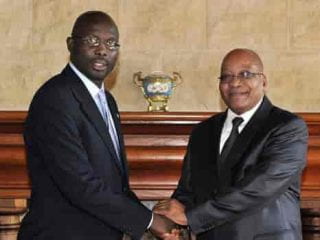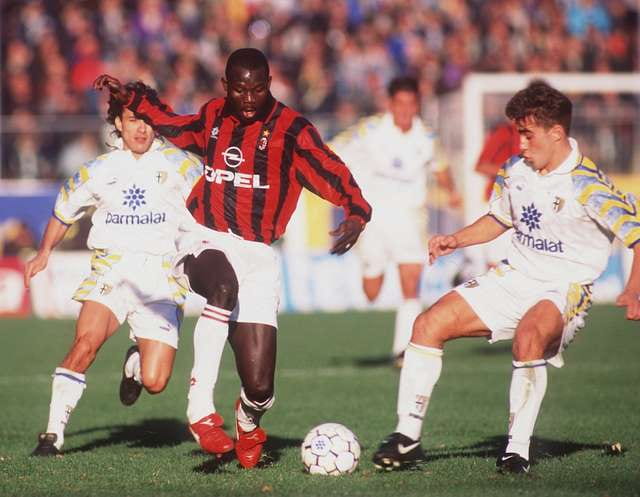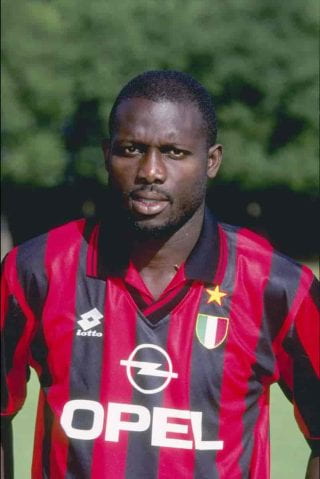During the 2022 FIFA World Cup, in the 34th minute of the USA-Wales match, held at the Ahmad Bin Ali Stadium in Al-Rayyan in Qatar, Yunus Musa and Josh Sargent initiated a collective offensive action and brought in Christian Pulisic. Pulisic made a well-timed run towards the Welsh defensive line. Timothy Weah followed Pulisic’s movement by making a run across the defensive line, prompting Pulisic to deliver him a precise pass. With great dexterity, Timothy slipped the ball past Wayne Hennessey (Wales’s keeper) and sent the ball into the net, scoring the opening goal for the USA in the tournament, the first USA goal in a World Cup in eight years. I watched this exciting game with some friends, and when Timothy scored, I whispered, “He got it from George.” My friend beside me asked, “Who is George?” I responded, “George Weah, his father, the current President of Liberia and the only African player to have ever won the Ballon d’Or.” He replied, “I had no idea.”
George Tawlon Manneh Oppong Ousman Weah was born in Monrovia, Liberia, on October 1, 1966. His parents separated when he was still a baby, and he was raised by his paternal grandmother in the Clara Township, a poor neighborhood in Monrovia. George struggled within the school system, performed poorly and eventually dropped out during his final year of high school. His soccer journey began on the streets at a young age, and he started his professional career with the Liberian club Young Survivors in 1985. Weah’s exceptional talent propelled him to the pinnacle of Liberian soccer, and he went on to play for clubs in Ivory Coast and Cameroon. While with the Cameroonian club “ Tonnerre Yaoundé,” he caught the attention of Claude le Roy, who was then the coach of the Cameroonian national team. Le Roy introduced Weah to Arsene Wenger, who used to come to Africa scouting for young talents. Wenger was quickly seduced by Weah’s abilities and arranged his transfer to AS Monaco in France in 1988. At AS Monaco, the Clara Township boy quickly established himself as a top striker, consistently scoring goals. Weah’s performances at the club earned him, in 1989, the African Player of the Year award. He played a key role in the club’s triumph in the “Coupe de France” in 1991. In 1992, Weah helped the club reach the final of the European Cup Winners’ Cup.
In 1992, Weah left Monaco to join Paris Saint-Germain (PSG), continuing his remarkable performance. With Weah in its squad, PSG won the French league title and three other domestic trophies over a period of three years. During his time with PSG, he was consecutively named African Player of the Year in 1994 and 1995. In 1995, he transferred to AC Milan, where he continued to amaze the soccer world. His early exploits with AC Milan and his previous successful stint at PSG earned him the the Golden Ball award in 1995, making him the first and, till today, the only African and the second African born (the first was the Portuguese striker Eusébio da Silva Ferreira born in Maputo, Mozambique) player to be given this prestigious award. Weah had some of his best years in soccer with the Italian club, contributing to their Serie A title win in the 1995-96 season. He was renowned for his extraordinary dribbling skills and goal-scoring prowess. In 2000, Weah played on loan for Chelsea for a short period before departing from AC Milan to play for Manchester City in the 1999-2000 season. He returned to France and joined Marseille for the 2000-01 season, scoring few goals for the club. Subsequently, Weah ventured outside of Europe to Abu Dhabi, where he joined Al-Jazira, playing in the United Emirates Pro League until his retirement in 2003.
While most of George Weah’s remarkable soccer moments were with international clubs, he represented the Liberian national team and stood as its most iconic player. The lone star was the critical actor in leading Liberia to its first African Cup of Nations participation in 1996 and subsequently in 2002. Despite Liberia’s relatively low profile in international soccer, Weah remained dedicated to his national team and served as its captain. He often financially supported the team and facilitated transfers to many European clubs for his teammates. In Liberia, George Weah’s soccer career is celebrated not only for his international achievements but also for the solace, joy and comfort he brought to his compatriots during Liberia’s tumultuous civil war, which greatly affected Liberian lives. In the aftermath of the civil war, he also utilized his fame and resources to contribute to Liberia’s education, healthcare and youth development initiatives. George Weah broke barriers and paved the way for many African players to succeed in top European leagues.

After ending his football career, George Weah entered politics. Here he meets South African President Jacob Zuma in 2012.
After retiring from professional soccer, George Weah transitioned to politics. He initially ran for the presidency of Liberia in the 2005 elections but was unsuccessful in his bid. He, nevertheless, remained active in Liberian politics, serving as a senator, and gaining valuable political experience. In 2017, he made another presidential bid, this time as the candidate for the Coalition for Democratic Change. He emerged victorious in the runoff election in December 2017, becoming Liberia’s 25th president. George Weah’s presidency marked a historic moment for Liberia, as he became the first former professional footballer to lead an African country. George Weah’s remarkable journey from a poor slum of Monrovia to becoming a global soccer icon and a political leader is a testament to his talent, determination and far-reaching influence on the world stage.
Carmel Dansou is a graduate student in physics at UARK. He is a lover of soccer. He enjoys watching as much as playing soccer. Carmel’s favorite team is Nigeria. His two favorite players of all time are Franck Henry Pierre Ribéry, a former French professional winger and Augustine Jay Jay Okocha, a former Nigerian professional midfielder.


